
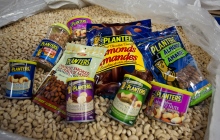
Photo by Sandra Strangemore
Making healthy profits when you’re literally working for peanuts, in a manner of speaking, may sound like a no-win proposition at first, but that’s exactly what the folks at Johnvince Foods Ltd. (JVF) in Toronto have been doing for three decades and counting.
Started up in 1975 in a garage of company founder Vince Pulla, who began roasting peanuts on a stew pot for sale to local flea-markets and street vendors, the company’s stellar ascent through the Canadian snack-food industry ranks has been nothing less than meteoric.
Today, the multimillion-dollar company employs about 600 people at three production and packaging plants in Toronto and a sister facility in Montreal, with its rock solid product portfolio comprising such popular packaged peanut and nut brands as Planters, Wasco, Reddi-Snack, Beaver, St. Arnaud, McNair, Organically Yours, Candy Guy, Sour Simon, Charlies Snacks, Julia Elizabeth Gourmet and Cottage Farms.
Shipping its products throughout Canada and to select markets in the eastern U.S., the bulk of JVF’s output unfolds at the company’s state-of-the-art, 350,000-square-foot central production facility in Toronto’s northwest—operated by the founder’s son and chief executive officer Joe Pulla—which usually runs two daily shifts, five days per week, to process and package millions of pounds of nuts, mostly peanuts, per month.
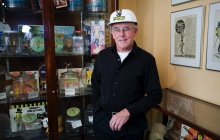
Photo by Sandra Strangemore
“We are fortunate to own the Canadian rights to the Planters nuts brand,” chief operating officer Tom Copping told Canadian Packaging during a recent visit to the lively facility, considered to be one of North America’s leading suppliers of bulk nuts and nut-mixes, dried baking goods, baking ingredients and confectionery items—supplying just about every major grocery chain in Canada.
According to Copping, securing Canadian rights to the iconic Planters brand during the 1990s was pivotal to the company’s emergence as a serious and well-respected food industry player.
“While Kraft owns the Planters brand worldwide,” he explains, “we are, for all intents and purpose, ‘Planters Canada,’ with this brand playing a large part of our day-to-day operations.”
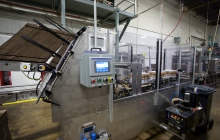
Photo by Sandra Strangemore
Having been with JVF for 28 years, Copping credits much of its success to unrivaled ability to anticipate future market trends and staying ahead of the industry curve—such as embarking on a new growth path during the 1980s in the bulk-format segment of the industry.
BULKING UP
“By allowing the customer to purchase our goods in bulk,” Copping reflects, “not only were we able to pass along a substantial cost-savings, but we also became a more environmentally-
friendly company, due to the fact that our bulk products have a lot less packaging attached to them.
“We have been fortunate to have the opportunity to work alongside most major Canadian grocery chains, independent grocery stores, grocery producers and wholesalers, club stores, department chains, drug retailers, major and independent convenience stores, bulk retailers, and wholesale distributors along the way,” relates Copping, adding that continuous investment in new production machinery and employee training have also played key roles in driving the company’s growth.
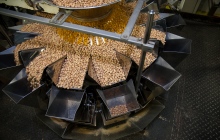
Photo by Sandra Strangemore
“We are always looking for ways to save—whether it is time, effort or simply production costs—so we are constantly reinvesting and installing the most progressive processing and packaging machinery to help us better transform raw materials into the high-quality finished product that the company has become known for in the bulk food and packaged goods trades,” states Copping, citing the company’s recent inclusion in the annual 50 Best Managed Companies rankings, jointly compiled by Deloitte, CIBC Commercial Banking, the National Post newspaper, and the Queen’s School of Business.
Operating a total of more than 40 processing and packaging lines across its four facilities, the company uses a broad range of packaging formats for its products, Copping relates, including glass and PET (polyethylene terephthalate) bottles, composite cans, laydown bags, stand-up pouches, plastic tubs, and bulk 12-kilogram and 25-kg bags.
At the central Toronto facility, a high-speed bottling line provides a compelling example of a highly efficient packaging operation employing some of the best packaging systems and equipment available in the marketplace.
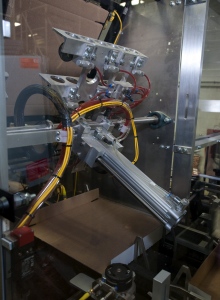
Photo by Sandra Strangemore
The line operation begins with the placement of palleted loads of 700-gram glass bottles—supplied by the Pointe-Claire, Que.-based Pretium Canada Company—onto heavy-duty Priority One Packaging conveyors, where the bottles are inverted upside down so that all the dust and foreign particles are blown out and purged from the containers, which are then realigned into the proper packaging sequence.
The clean bottles are then conveyed down to a high-performance rotary filling machine—manufactured by Eagle Manufacturing Co.—to be precisely filled with the selected product, which is dispensed via a 14-head CombiScale weigher positioned directly above.
After passin
g through a metal detection unit, the filled bottles are sprayed with a mist of cryogenic liquid nitrogen mixture on top to boost the products’ shelf-life, and a 12-head Reynolds Metal capper applies the plastic caps with inner foil seals—supplied by Pano Cap Canada Ltd.—onto the bottles. From there, the foil seals are securely fastened onto the bottles’ rims by a high-speed induction heat-sealing system from Enercon Industrial Corp. before the conveyor—controlled by a Speedmaster adjustable velocity controller and a Leeson electric 90-Volt direct current permanent magnet motor from Leeson Canada—whisks the fully-capped bottles onto the Marathon model labeling station, supplied by B&H Labelling Systems.
Controlled by a Simatic Multipanel HMI (human-machine interface) panel supplied by Siemens Canada Ltd., the Marathon labeler works in conjunction with a model Dura Blue 10 adhesive melter from Nordson Corporation, which is programmed to apply adhesive beads to the main part of the full-body labels that are immediately affixed to the glass jars.
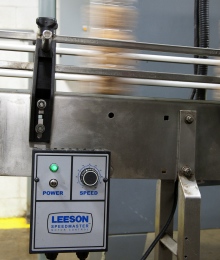
Photo by Sandra Strangemore
The labeled bottles than pass through the Excel inkjet printer from Videojet Technologies Inc., which instantly applies all the proper lot numbers and best-before dates onto the passing bottles, which continue their journey to the secondary packaging stage.
According to Copping, the plant’s secondary packaging capabilities have been dramatically enhanced with the recent installation of an MK-CPT Intermittent Motion Tray Loader system from AFA Nordale Inc., a renowned manufacturer of custom-designed automated packaging systems based nearby in Brampton, Ont.
“We just had the equipment installed this past September,” says Copping, citing a good past working relationship with AFA Nordale as one of the chief reasons for this equipment selection.
“Not only do AFA Nordale machines have an excellent reputation for reliability,” he notes, “but they also fulfilled a requirement of us to buy Canadian whenever we can; it’s very important to us to always have suppliers nearby to provide same-day service should the need ever arise.”
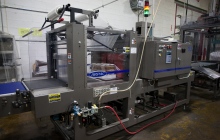
Photo by Sandra Strangemore
Adds the plant’s maintenance manager Stephen Tanswell: “We’ve purchased AFA Nordale equipment for several years now, and we do not hesitate to return to them if they have a product that fits our needs.”
Controlled by onboard Allen-Bradley PanelView Plus 700 electronic operator interface from Rockwell Automation, the new tray-loader springs into action by taking the pre-loaded corrugated die-cut trays, loading them up with a dozen 700-gram bottles per tray, folding the 2.5-mm-high sides, and sealing them securely with a gluing machine from National Adhesives Packaging Sealing Solutions.
CASE IN POINT
After the 12-packs of bottled products exit the MK-CPT tray-loaders, they are conveyed past a Videojet 2330 inkjet case-coder to have the product names and a barcodes applied onto the sides of the corrugated trays, which are then conveyed onto the model 25TW-28 tray shrinkwrapper from ARPAC Group, where a sheet of plastic film is heatshrunk around the bottles and the tray exterior.
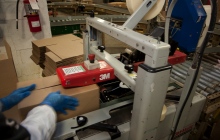
Photo by Sandra Strangemore
According to Copping, switching over to the new tray format from standard corrugated cases is expected to yield several production and environmental advantages for the bottling line operations.
“We feel it’s a more environmentally-friendly option for us,” he asserts. “Along with requiring less product to manufacture the trays, meaning there’s less waste, the trays are very easy to open and to display the merchandise at the retail level.”
While the finished trays are currently loaded onto pallets by hand, Tanswell says he expects this function to be fully-automated in the near future with installation of a model AF-GRT automatic palletizer from AFA Nordale, which previously also supplied the plant with two PL-GRP gantry robotic palletizers, an MK-1000e intermittent tray-erector, and a custom-designed carton-erector.
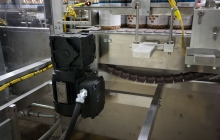
Photo by Sandra Strangemore
“Along with excellent reliability of the AFA Nordale machines,” Tanswell states, “we have always received excellent follow-up service on all of their equipment.
“We’re not afraid to ask exactly for what we want,” he points out. “Even our Heat and Control roaster contains some proprietary equipment that helps us run our production line just the way we want it.
“We’re happy that companies like AFA Nordale buy into that philosophy—designing and supplying us with the right machinery that helps us to do our job to the best of our ability.”
Other notable high-performance packaging equipment employed at the JFV plant include:
• A pair of model RP-147T-Z-24 duplex/quarto horizontal filling and sealing machines from PSG Lee—high-throughput stand-up pouch baggers capable of processing up to 75 zippered pouches per minute by utilizing PIAB AB vacuum suction robotic grippers;
• A robust, fully-automated 3M-Matic case-sealer manufactured by 3M Company—used to glue shut cartons loaded up with the finished pouches of product.
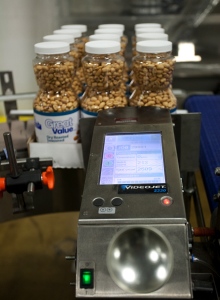
Photo by Sandra Strangemore
Says Copping: “We spend a lot of time and effort constantly reinvesting in state-of-the-art equipment to maintain a leading edge in our manufacturing and production efficiencies.
“Nowadays, it’s all about presenting a healthy alternative to the pre-conceived notion of snack-foods, so we have to innovate and be aware of both consumer trends and of what our competitors are doing,” he says, adding that JVF was the first peanut-processing company in Canada to launch its products in fully-resealable, gusseted stand-up pouches.
Noting that the unfolding trend toward more healthy foods with less fat and more fiber and nutrients is here to stay, “Fortunately our nut products offer all of those things—and there’s nothing like giving the people what they want,” he sums up.
“For us, the ability to match the right equipment with the right innovative packages and the right products gives us exactly what we need to continue to meet the ever-changing needs of the marketplace.”
Advertisement

